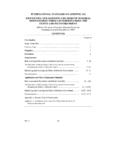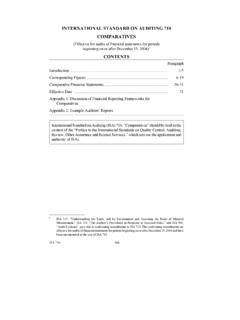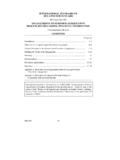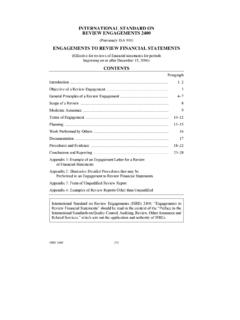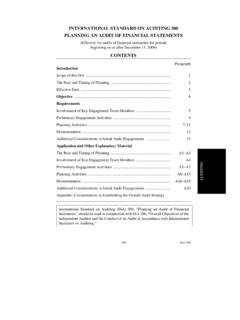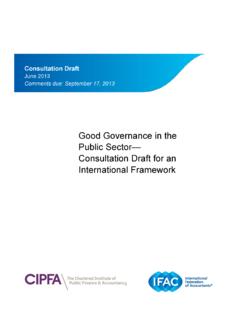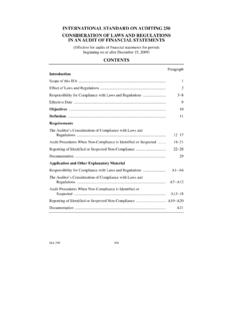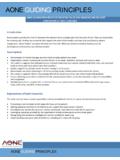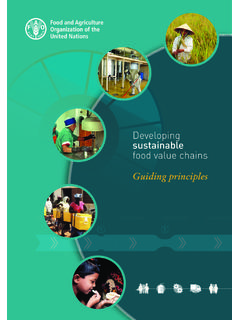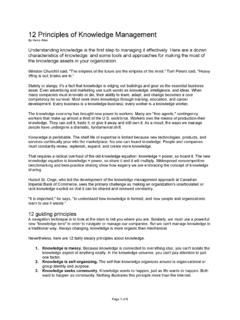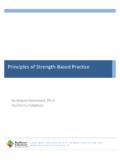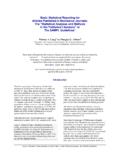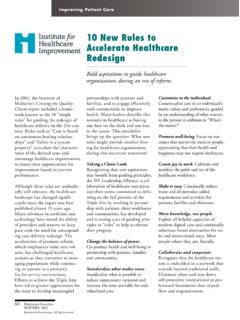Transcription of A Global Debate on Preparing Accountants for Finance ...
1 THE ROLE AND EXPECTATIONS OF A CFOA Global Debate on Preparing Accountants for Finance LeadershipDiscussion Paper2 The mission of the International Federation of Accountants (IFAC) is to serve the public interest by: contributing to the development of high-quality standards and guidance; facilitating the adoption and implementation of high-quality standards and guidance; contributing to the development of strong professional accountancy organizations and accounting firms and to high-quality practices by professional Accountants , and promoting the value of professional Accountants worldwide; and speaking out on public interest Professional Accountants in Business (PAIB) Committee serves IFAC member bodies and professional Accountants worldwide who work in commerce, industry, financial services, education, and the public and not-for-profit sectors. Its aim is to promote and contribute to the value of professional Accountants in business. To achieve this objective, its activities focus on: increasing awareness of the important roles professional Accountants play in creating, enabling, preserving, and reporting value for organizations and their stakeholders; and supporting member organizations in enhancing the competence of their members through development and sharing of good practices and will use this Discussion Paper in conjunction with outreach to initiate a Global Debate among various stakeholders.
2 Respondents can also submit their comments electronically through the IFAC website, using the Submit a Comment button. IFAC encourages a Global dialogue involving a broad range of stakeholders, including professional accountancy organizations, employers, regulators, and professional resources on the topic, as well as a summary of this paper that includes specific discussion questions, are available on the IFAC approved text of this guidance is published in the English language. The PAIB Committee welcomes translation of its publications in other languages. Please contact Drafts, Consultation Papers, and other IFAC publications are published by, and copyright of, does not accept responsibility for loss caused to any person who acts or refrains from acting in reliance on the material in this publication, whether such loss is caused by negligence or IFAC logo, International Federation of Accountants , and IFAC are trademarks and service marks of October 2013 by the International Federation of Accountants (IFAC).
3 All rights reserved. Permission is granted to make copies of this work to achieve maximum exposure and feedback provided that each copy bears the following credit line: Copyright October 2013 by the International Federation of Accountants (IFAC). All rights reserved. Used with permission of IFAC. Permission is granted to make copies of this work to achieve maximum exposure and : 978-1-60815-163-9 Published by:3 Table of ContentsPREPARING PROFESSIONAL Accountants FOR Finance LEADERSHIP 4 HOW THE CFO ROLE IS CHANGING 7 principles guiding THE ROLE AND EXPECTATIONS OF A CFO 10 RECOMMENDATIONS FOR THE ACCOUNTANCY PROFESSION AND EMPLOYERS OF PROFESSIONAL Accountants 234 Preparing Professional Accountants for Finance LeadershipPrinciples guiding the Role and Expectations of a CFOA professional chief financial officer (CFO) should:A. Be an effective organizational leader and a key member of senior management;B. Balance the responsibilities of stewardship with business partnership;C. Act as the integrator and navigator for the organization;D.
4 Be an effective leader of the Finance and accounting function; andE. Bring professional qualities to the role and the five principles establish a framework for understanding the changing expectations, scope, and mandate of the person who exercises leadership in the most senior Finance management position in an organization or in one of its separately managed units that is, the CFO or equivalent, such as a Finance director or vice president of principles capture the key requirements of the CFO role and highlight what professional Accountants need to do to prepare for Finance leadership, as well as the benefits of a professional accountant serving as the part of good governance, organizations should place the responsibility of sound and ethical financial management and reporting, and more broadly the efficient and productive use of resources, under the oversight of a person with the necessary skills, qualities, and professional training, expertise, and experience professional Accountants bring to the CFO role should be seen as an advantage specifically in terms of uniting an ethical and technical mindset together with business , professional Accountants in related Finance leadership roles are far from universal.
5 The most common level of education for a CFO is a degree in Finance (29%) followed by a chartered (professional) accountancy qualification (27%) and an MBA (27%), according to a 2010 EY survey of 669 CFOs in Europe, the Middle East, India, and Africa, conducted by the Economist Intelligence Recently, the number of professional Accountants in the CFO role has declined in some jurisdictions, particularly in larger organizations. However, this decline is reversing in some locations, such as in the US where CFOs who were also Certified Public Accountants increased to 38%, up from 25% in trend has significant implications for professional accountancy organizations (PAOs) in their efforts to adequately prepare professional Accountants for career progression to Finance on Competent and Versatile: How Professional Accountants in Business Drive Sustainable Success, this discussion paper starts a Global Debate among PAOs and employers of professional Accountants on the key implications of the changing expectation on CFOs for the education, training, and development of professional seeks to encourage a dialogue on both the principles and proposed recommendations to prepare aspiring Accountants to acquire and develop the skills needed to be an effective Finance and organizational leader.
6 The proposed actions are relevant for PAOs, which need to continually review their qualifications and training at both a pre- and post-certification level, and for employers 1 EY, The DNA of the CFO: A Study of What Makes A Chief Financial Officer 20102 Maxwell Murphy, CFOs Serving Longer Terms, Wall Street Journal, August 9, 20135of professional Accountants , who also directly influence preparation for , this discussion is also relevant to the regulatory community that is striving for well-governed organizations and market integrity. The CFO is a critical part of a chain of actors, including the governing body ( , board of directors), chief executive officer (CEO), audit committee, and auditor that all have their respective responsibilities to ensure that business reporting provides relevant, faithful, and comparable information on the financial position and performance of an organization. Having professional Accountants in key Finance leadership roles is an important part of ensuring well-governed the role of auditors and assurance professionals, which is typically subject to oversight and registration, qualification, competency, and licensing requirements, Finance leadership in organizations is largely unregulated.
7 In this context, the onus is on organizations to ensure they employ Finance leaders with the prerequisite professional qualities and competence. In 2009, in its submission to the Group of Twenty (G20), IFAC recommended that the G20 call for the establishment of an international, principles -based competency threshold for senior financial officers in public interest Recommendation Four, Recommendations for the G20 Nations Meeting of September 24 25 (IFAC, 2009), and Recommendations for Working Group 1 Enhancing Sound Regulation and Strengthening Transparency (IFAC, 2009)The increasing expectation of CFOs and Finance and accounting (F&A) functions also extends to government and public sector organizations, where there is a clear need for enhanced Finance leadership and public financial management to improve the quality of public sector transparency, accountability, and transparency, financial stability, and performance of governments and public sector organizations are closely linked with quality and professionalism of the CFO and the F&A function.
8 Consequently, CFOs expertise and advice are essential elements in an effective leadership team as well as for ensuring that strong management practices and information systems, supported by an appropriate governance infrastructure and ethical culture, are in Accountants in BusinessProfessional Accountants in business refer to all those members of the profession who work in commerce, industry, financial services, education, and the public and not-for-profit sectors. Professional Accountants in business work as employees, consultants, and self-employed owner-managers or advisers and support their organizations in a wide range of job functions at various Accountants working in business can typically be found in four types of roles: as value creators, enablers, preservers, and reporters. The CFO principles relate to these roles and will need to ensure success in each by: creating value developing strategies for sustainable value creation; enabling value supporting the governing body and senior management in making decisions and facilitating the understanding of performance of organizational functions or units; preserving value asset and liability management, managing risk in relation to setting and achieving the organization s objectives, and implementing and monitoring effective internal control systems; and reporting value ensuring relevant and useful internal and external business on the route they have taken, professional Accountants may have trained and qualified while working in public accounting and, later in their career, moved to work for an organization.
9 Others, typically known as management Accountants , have trained and qualified within a corporate or public sector environment. Professional Accountants are recognized by different designations around the world for example, Chartered Accountant (CA), Certified Public Accountant (CPA), Chartered Professional Accountant (CPA), Certified Accountant, Chartered or Certified Management Accountant (CMA), Expert Comptable, or Contador past few decades have witnessed significant growth in the demands on and expectations of Finance leaders, particularly as they have become central to helping their organizations navigate an increasingly complex business to the 1990s, the main emphasis of the CFO s role was typically as the guardian of the financial health of an organization, overseeing and implementing adequate financial control infrastructure. This met the needs, in particular, of large divisional industrial corporations that strived for financial control and transparency across many divisions and business units.
10 Since then, the range of responsibilities of the CFO has expanded, driven by complexity as a result of globalized capital and markets, regulatory and business drivers, growth in information and communications, and changing expectations of the role of the addition to being the financial gatekeeper, the CFO is also expected to participate in driving the organization toward achieving its objectives. As part of the leadership of the organization, CFOs are expected to increase their support of strategic and operational decision making in a business partnering capacity in addition to fulfilling traditional stewardship responsibilities relating to governance, compliance and control, and business ethics. In forward-looking organizations, the CFO and the F&A function are evolving from a transactional and cost efficiency focus to an increasingly value-adding strategic leaderBusiness partner and stewardIntegrator and navigatorFinance and accounting leaderProfessionalPAIB as Enabler of ValuePAIB as Creator of ValuePAIB as Preserver of ValuePAIB as Reporter of ValueHow the CFO Role is Changing8A good CFO should be at the elbow of the CEO, ready to support and challenge him/her in leading the business.

